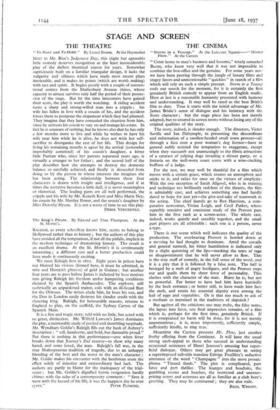STAGE AND SCREEN
THE THEATRE
" To Have and To Hold." By Lionel Brown. At the Haymarket
NEXT to Mr. Rice's Judgement Day, this slight but agreeable little comedy deserves recognition as the least inconsiderable play of the dullest theatrical season for years. Somewhat capriciously built on a familiar triangular design, it lacks the vulgarity and silliness which have made most recent plays intolerable, and it makes its points (which are worth making) with tact and spirit. It begins poorly with a couple of conven- tional comics from the Shaftesbury Avenue shires, whose capacity to amuse survives only half the period of their posses- sion of the stage. But by the time latecomers have gained their seats, the play is worth the watching. A riding accident turns a sharp and strong-willed man into a cripple ; his wife has fallen in love with a cousin of his, and the accident forces them to postpone the elopement which they had planned. They imagine that they have concealed the situation from him, since he entreats his cousin to stay on and manage his estate. In fact he is unaware of nothing, but he knows also that he has only a few months more to live and while he wishes to have his wife near him while he is alive, he does not wish her self- sacrifice to disorganise the rest of her life. This design for living his remaining months is upset by the arrival (somewhat improbably contrived) of his cousin's daughter, a bitter little Puritan who, since her parents separated years ago, is virtually a stranger to her father ; and the second half of the play describes how she attempts to destroy the domestic balance so carefully achieved, and finally is dissuaded frogs doing so by the person in whose interests she imagines she has been acting. The relationship between these four characters is drawn with insight and intelligence, and if at times the narrative becomes a little dull, it is never meaningless or rhetorical. The leading parts are all well performed, the cripple and his wife by Mr. Keneth Kent and Miss Marie Ney, his cousin by Mr. Hartley Power, and the cousin's daughter by Miss Dorothy Hyson. It is not a waste of time to see this play.
DEREK VERSCHOYLE.














































 Previous page
Previous page